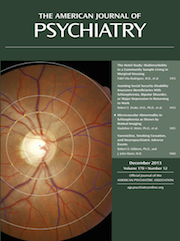T
o the E
ditor: Recent studies (
1,
2) have demonstrated the advantages of genome-wide chromosomal microarray analysis over karyotype for the prenatal detection of pathogenic copy number variants. Chromosomal microarray analysis may soon become the standard of care in the prenatal setting (
1,
2). Not discussed is the potential for later-onset phenotypes of findings identified in utero and the resultant ethical and societal challenges. For example, 22q11.2 deletions are associated with a 20%−25% risk of schizophrenia and more than 60% lifetime risk for any treatable psychiatric disorder (
3). Other large (e.g., >500 kb) copy number variants are now known to be enriched in diverse neuropsychiatric diseases and are absent or very uncommon in control populations (
4). To date, schizophrenia is the best studied later-onset disease for which there are replicated associations of moderate or greater effect size with specific copy number variants (
5,
6). We therefore quantified the extent to which clinically significant copy number variants reported to patients in a study of prenatal chromosomal microarray analysis (
1) were also known to be associated with greater risk for schizophrenia.
In this largest study to date (
1), established schizophrenia risk variants accounted for 49% (17 of 35) of the copy number variants of definite clinical significance discovered in 3,822 karyotypically normal pregnancies. These included a 1q21.1 deletion, a 15q13.3 deletion, four 17q12 deletions, and 11 typical 22q11.2 deletions (
6,
7). All but one were de novo mutations. Fourteen (23%) of 61 additional copy number variants reported to patients as having the potential for clinical significance are associated with schizophrenia: three 1q21.1 duplications, one 2q13 duplication, one 15q11-q13 duplication, four 16p13.11 duplications, and five atypical 22q11.2 deletions (
5–
7). Thus, at a minimum, one in every 124 prenatal samples (31/3,822) sent for clinical chromosomal microarray analysis would be reported as having a clinically significant finding that might also be considered a schizophrenia risk variant. Notably, a typical 22q11.2 deletion was found in one in every 347 prenatal samples (including one in every 1,022 samples with no anomaly on ultrasonography). The true incidence of 22q11.2 deletions in live births remains unknown (
8). Analyses of data from other smaller studies of prenatal chromosomal microarray analysis yielded comparable results (data not shown).
Prenatal detection of copy number variants with attendant elevated risk for schizophrenia and multiple other conditions is increasingly a reality. Demand for early interventions to reduce such risks (
9) is likely to increase. There are associated ethical and societal implications that have been previously considered mostly in the abstract for later-onset diseases like schizophrenia. The opinions of patients, families, psychiatrists, and other key stakeholders are largely unknown. Lessons learned from now-familiar scenarios in prenatal genetic testing, such as the association of Alzheimer’s disease with trisomy 21, will help guide our approach to prenatal testing using chromosomal microarray analysis.

